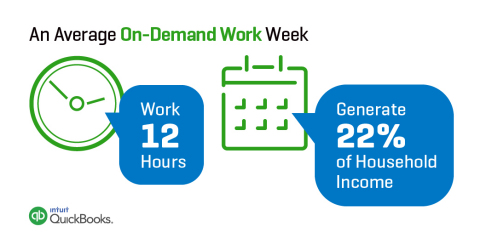MOUNTAIN VIEW, Calif.--(BUSINESS WIRE)--A groundbreaking examination of people working at eleven on-demand economy and online talent marketplace companies is shedding new light on the debate about worker classification in the on-demand economy. The new data from Intuit Inc. (Nasdaq: INTU) and Emergent Research shows that the typical on-demand worker is a part-timer, working 12 hours a week via his or her primary platform and collecting 22 percent of their household income from work obtained through online marketplaces or applications that connect providers to customers.
The new data is a preview of a comprehensive study – Dispatches from the New Economy: The On-Demand Workforce – that will be released in the New Year. The study will provide a detailed analysis of the demographics, motivations and challenges of workers pursuing on-demand jobs. Companies participating in the study include Uber, Upwork (formerly Elance-oDesk), Wonolo, MBO Partners, OnForce, Work Market, Visually, HourlyNerd and Fiverr, Deliv and Field Nation.
“The on-demand economy is accelerating a shift to self-employment that is having a transformative effect on our economy and the future of work,” said Alex Chriss, vice president and general manager of Self-Employed Solutions at Intuit. “There is the potential to fuel this new wave of innovation and support an expanding entrepreneurial population but it will require a new mindset and most importantly, a deep and objective understanding of the aspirations, motivations and pain points of those choosing to work for themselves and on-demand.”
On-Demand Workforce Study
The study also looked at the motivating factors and satisfaction levels of on-demand workers.
Key findings include:
-
On-demand work is primarily part-time:
- The average person working in the on-demand economy spends 12 hours per week working via their primary partner company.
- Forty-three percent have either a traditional full time job (29 percent) or part-time job (14 percent) (receive W2s).
- Only five percent said a single on-demand platform provided their sole source of income.
-
The on-demand economy provides important opportunities for income
augmentation:
- The primary reason people choose to be independent contractors in the on-demand economy is to earn more money (72 percent).
- A secondary motivation is flexibility (60 percent).
-
Most on-demand economy workers (70 percent) are satisfied with
their work
- Fifty-four percent identified as highly satisfied, 16 percent as satisfied, and 22 percent as dissatisfied.
-
Most plan to continue working via their on-demand economy partner
in the year ahead:
- Eighty-one percent of workers said they expect to continue working with their on-demand economy partner over the next year. Forty-seven percent say they will definitely continue and 34 percent say they will probably continue. Only 3 percent will not continue.
Long-term Growth of Self-Employment
Earlier Intuit research from 2015 showed that an estimated 7.6 million Americans will be regularly working as providers in the on-demand economy by 2020, more than doubling the current total of 3.2 million. The rise of the on-demand economy is part of a broader long-term growth trend in the contingent workforce, which has grown from 17 percent of the U.S. workforce 25 years ago, to 36 percent today, and is expected to reach 43 percent by 2020.
Study Methodology
A total of 4,622 workers who find work opportunities via the platforms provided by the participating partner companies completed an online survey between September 11 and October 1, 2015. The results were weighted to reflect the proportion of workers in each of the following segments: Drivers/Delivery, Online Talent Marketplaces and Field Service/Onsite Talent. The weights were developed using earlier survey work that sized the on-demand economy. The largest weighted share of on-demand worker respondents from any single company is 16 percent, with most partner companies providing less than 10 percent of the respondents.
Intuit’s QuickBooks Self-Employed
Intuit’s QuickBooks Self-Employed product enables on-demand workers to manage business and personal finances, handle taxes throughout the year and meet compliance requirements. Intuit offers the product directly to on-demand entrepreneurs through partnerships with many of the leading on-demand economy marketplaces including Uber, Lyft and TaskRabbit.
About Intuit Inc.
Intuit Inc. creates business and financial management solutions that simplify the business of life for small businesses, consumers and accounting professionals.
Its flagship products and services include QuickBooks®, Quicken® and TurboTax®, which make it easier to manage small businesses and payroll processing, personal finance, and tax preparation and filing. Mint.com provides a fresh, easy and intelligent way for people to manage their money, while Demandforce® offers marketing and communication tools for small businesses. ProSeries® and Lacerte® are Intuit's leading tax preparation offerings for professional accountants.
Founded in 1983, Intuit had revenue of $4.5 billion in its fiscal year 2014. The company has approximately 8,000 employees with major offices in the United States, Canada, the United Kingdom, India and other locations. More information can be found at www.intuit.com.
About Emergent Research
Emergent Research is a research and consulting firm focused on identifying, analyzing and forecasting the key demographic, social, technology and economic trends and shifts impacting business and society. Emergent Research partners, Steve King and Carolyn Ockels, are co-authors of the Intuit 2020 Report and the Intuit Future of Small Business Report Series.
About Upwork
Upwork is the largest freelance talent marketplace. As an increasingly connected and independent workforce goes online, knowledge work — like software, shopping and content before it — is going online as well. This shift is making it faster and easier for clients to connect and work with professionals in near real-time and is freeing people from having to work at a set time and place. Freelancers earn more than $1 billion annually via Upwork. Upwork is headquartered in Mountain View, Calif., with offices in San Francisco and Oslo, Norway. For more information, visit www.upwork.com.








